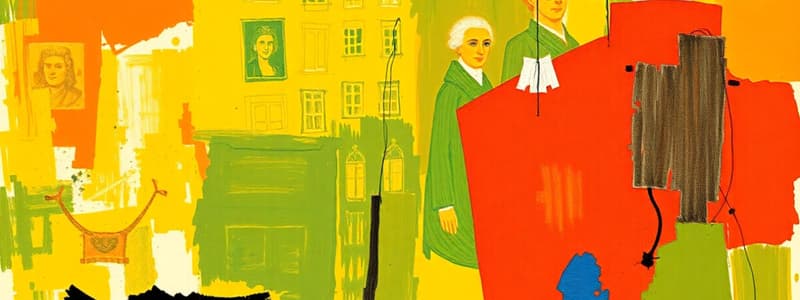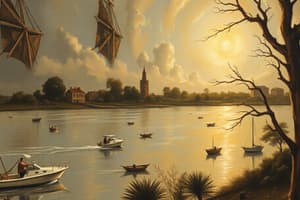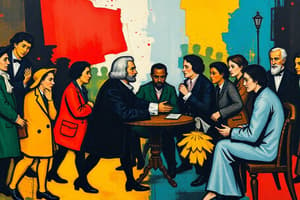Podcast
Questions and Answers
What does the Social Contract imply individuals must do?
What does the Social Contract imply individuals must do?
- Establish a separate sovereign power outside the General Will
- Retain all personal rights while forming a society
- Completely alienate their individual rights to each other (correct)
- Act solely based on personal will and desires
How does the General Will influence the relationship between individuals and the state?
How does the General Will influence the relationship between individuals and the state?
- The General Will operates independently of individual wills
- Individuals have total control over the General Will
- Individuals are subjects to the sovereign while also being citizens (correct)
- The state has no authority over individual actions
What challenge is posed to the establishment of the General Will?
What challenge is posed to the establishment of the General Will?
- The increased cooperation among individuals
- A universal agreement on societal rules
- The inherent conflict between individual and collective wills (correct)
- The growth of collectivism in society
In what capacity do individuals engage with the Sovereign according to the Social Contract?
In what capacity do individuals engage with the Sovereign according to the Social Contract?
What essential aspect is necessary for a society to possess a body politic ruled by the General Will?
What essential aspect is necessary for a society to possess a body politic ruled by the General Will?
What is the primary assertion regarding obedience in the text?
What is the primary assertion regarding obedience in the text?
What aspect of human nature does the text emphasize is difficult to understand?
What aspect of human nature does the text emphasize is difficult to understand?
What distinguishes 'natural man' from contemporary humans?
What distinguishes 'natural man' from contemporary humans?
What is noted about the concept of death in the state of nature?
What is noted about the concept of death in the state of nature?
What does Rousseau think about natural passions?
What does Rousseau think about natural passions?
Which characteristic does the 'savage man' lack according to the text?
Which characteristic does the 'savage man' lack according to the text?
What does Hobbes view as essential in defining natural laws?
What does Hobbes view as essential in defining natural laws?
What is a significant difference between 'amour de soi' and 'amour propre' as defined by Rousseau?
What is a significant difference between 'amour de soi' and 'amour propre' as defined by Rousseau?
What does the content suggest is the relationship between property owners and the social contract?
What does the content suggest is the relationship between property owners and the social contract?
According to the content, why do the poor consent to oppression?
According to the content, why do the poor consent to oppression?
What is contrasted with peace and stability in the discourse?
What is contrasted with peace and stability in the discourse?
What does the phrase 'Law of the Strongest' indicate about the prevailing power dynamics?
What does the phrase 'Law of the Strongest' indicate about the prevailing power dynamics?
What is the ultimate goal of establishing a (True) Social Contract according to the content?
What is the ultimate goal of establishing a (True) Social Contract according to the content?
What reasoning do enslaved peoples use regarding their condition as suggested in the content?
What reasoning do enslaved peoples use regarding their condition as suggested in the content?
In describing society's state, what is highlighted as lacking despite having peace and security?
In describing society's state, what is highlighted as lacking despite having peace and security?
How does the content suggest individuals who aim for freedom are perceived?
How does the content suggest individuals who aim for freedom are perceived?
What characteristics distinguish savage man from civilized man, according to Rousseau?
What characteristics distinguish savage man from civilized man, according to Rousseau?
According to Rousseau, how does the state of nature contribute to human happiness?
According to Rousseau, how does the state of nature contribute to human happiness?
What does Rousseau believe is responsible for the unique development of human beings?
What does Rousseau believe is responsible for the unique development of human beings?
Which of the following best describes Rousseau's view of civilized life compared to savage life?
Which of the following best describes Rousseau's view of civilized life compared to savage life?
What does Rousseau imply about the relationship between civilization and intellectual development?
What does Rousseau imply about the relationship between civilization and intellectual development?
What shared assumption about government does Rousseau present?
What shared assumption about government does Rousseau present?
What is the progression Rousseau describes that leads from basic needs to the development of reason?
What is the progression Rousseau describes that leads from basic needs to the development of reason?
How does Rousseau characterize the desires of savage man in comparison to civilized man?
How does Rousseau characterize the desires of savage man in comparison to civilized man?
What key idea did Rousseau present in his works regarding the relationship between progress in science and technology and morality?
What key idea did Rousseau present in his works regarding the relationship between progress in science and technology and morality?
In the 'First Discourse', what did Rousseau argue about the development of the arts and sciences?
In the 'First Discourse', what did Rousseau argue about the development of the arts and sciences?
Which concept did Rousseau challenge regarding social and political inequalities?
Which concept did Rousseau challenge regarding social and political inequalities?
What did Rousseau identify as the vices linked to various fields of science?
What did Rousseau identify as the vices linked to various fields of science?
How did Rousseau view the inhabitants of Archaic Greece in relation to their virtues?
How did Rousseau view the inhabitants of Archaic Greece in relation to their virtues?
What was the main question posed in Rousseau's 'Second Discourse'?
What was the main question posed in Rousseau's 'Second Discourse'?
What attitude did Voltaire express about Rousseau's writings?
What attitude did Voltaire express about Rousseau's writings?
What does Rousseau suggest people should prioritize over pleasures offered by the arts and sciences?
What does Rousseau suggest people should prioritize over pleasures offered by the arts and sciences?
Flashcards
Social Contract
Social Contract
An agreement where individuals give up their individual rights completely to form a collective body ruled by the General Will.
General Will
General Will
The collective will of the people, representing what is best for the whole society. It is formed by balancing individual wants and needs.
Alienation of Rights
Alienation of Rights
In the social contract, individuals completely give up their individual rights to the collective body.
Subjects vs. Citizens
Subjects vs. Citizens
Signup and view all the flashcards
Problem of Sovereignty
Problem of Sovereignty
Signup and view all the flashcards
Natural Obedience
Natural Obedience
Signup and view all the flashcards
Founder of Civil Society
Founder of Civil Society
Signup and view all the flashcards
Human Nature in Rousseau's View
Human Nature in Rousseau's View
Signup and view all the flashcards
State of Nature
State of Nature
Signup and view all the flashcards
Natural Man
Natural Man
Signup and view all the flashcards
Self-Love (amour de soi)
Self-Love (amour de soi)
Signup and view all the flashcards
Pity (Compassion: 'Pitié')
Pity (Compassion: 'Pitié')
Signup and view all the flashcards
Is Natural Man Good?
Is Natural Man Good?
Signup and view all the flashcards
Rousseau's Ambiguous Enlightenment
Rousseau's Ambiguous Enlightenment
Signup and view all the flashcards
Voltaire's Critique of Rousseau
Voltaire's Critique of Rousseau
Signup and view all the flashcards
Rousseau's 'Social Contract'
Rousseau's 'Social Contract'
Signup and view all the flashcards
The First Discourse: Questioning Progress
The First Discourse: Questioning Progress
Signup and view all the flashcards
First Discourse: Sciences and Vices
First Discourse: Sciences and Vices
Signup and view all the flashcards
The Second Discourse: Natural vs. Artificial Inequality
The Second Discourse: Natural vs. Artificial Inequality
Signup and view all the flashcards
Rousseau's Revolutionary Idea
Rousseau's Revolutionary Idea
Signup and view all the flashcards
Hobbesian Social Contract
Hobbesian Social Contract
Signup and view all the flashcards
The Law of the Strongest
The Law of the Strongest
Signup and view all the flashcards
Domination vs. Independence
Domination vs. Independence
Signup and view all the flashcards
Blind Ambition and Domination
Blind Ambition and Domination
Signup and view all the flashcards
The State of Nature
The State of Nature
Signup and view all the flashcards
True Social Contract
True Social Contract
Signup and view all the flashcards
Society as a Body
Society as a Body
Signup and view all the flashcards
Peace vs. Freedom
Peace vs. Freedom
Signup and view all the flashcards
Rousseau's 'Savage Man'
Rousseau's 'Savage Man'
Signup and view all the flashcards
Rousseau's 'Civilized Man'
Rousseau's 'Civilized Man'
Signup and view all the flashcards
Perfectibility
Perfectibility
Signup and view all the flashcards
Reason in Rousseau's Theory
Reason in Rousseau's Theory
Signup and view all the flashcards
Natural Passions
Natural Passions
Signup and view all the flashcards
Trigger for Development
Trigger for Development
Signup and view all the flashcards
Shared Assumption
Shared Assumption
Signup and view all the flashcards
Study Notes
Rousseau's Discourse on Inequality
- Rousseau (1712-1778) was a figure of the Enlightenment.
- He believed reason could bring scientific development, moral progress, and happiness.
- He compiled knowledge in the Encyclopédie.
- He held a revolutionary view on the state, but argued progress in science and technology corrupted morals.
- Voltaire criticized Rousseau's work, saying "Never was such cleverness used in the design of making us all stupid."
- Rousseau wrote The Social Contract in 1762.
- A famous quote is "Man is born free yet everywhere he is in chains."
First Discourse (on the Sciences and the Arts)
- Written in 1750, it was a contest by the Académie of Dijon.
- The question posed was: Has the development of sciences and arts purified morals?
- Rousseau's perspective was a counter-Enlightenment stance.
- He argued that ancient Greece, preceding Plato, thrived by focusing on heroic virtues.
- In contrast, the decline of Greece corresponded with the rise of arts and sciences, which fostered luxury and weakened virtue.
First Discourse (continued)
- Rousseau argued that sciences originated from vices, with physics stemming from vain curiosity and astronomy from superstition.
- Moral philosophy was also criticized because of its focus on pride.
- Promoting luxury and pleasure over virtue wasn't morally beneficial.
- Emphasizing special talents over virtuous character drew attention to people without virtue.
- The overall message questioned societal progress.
Second Discourse on Inequality
- Published in 1755, this discourse addressed the origin of inequality among men.
- It questioned if this inequality was justified by natural law.
- Rousseau separated natural and artificial inequalities.
- He questioned if natural differences could justify social stratification.
- Rousseau questioned if social and political inequalities stemmed from natural or man made factors.
- He argued that no one had a natural right to command another human.
Human Nature
- It's difficult to define human nature accurately.
- Scientific knowledge isolates us from our true nature.
- Rousseau contrasted the historical account of humanity (presented as fiction) with the need for empirical evidence.
- He proposed humanity existed differently during a period before social development and civilization.
- He criticized Hobbes' view of human nature as inherently selfish, suggesting Hobbes wrongly interpreted humanity.
- Individuals are needy, dependent, and weak, but it doesn't justify the assumption they are fundamentally, naturally, so.
The State of Nature
- Rousseau described the state of nature as one where humans were similar to animals in some ways.
- Humans were weaker physically, with greater mental capabilities.
- Humans were strong, agile, adaptable, and readily dealt with illnesses.
- Their wants and needs were simple, involving basic necessities: food, shelter, sex.
- There was no complex thought, language, abstract ideas, or concept of time.
The State of Nature (continued)
- There was no fear of death or an attachment to beauty or morality.
- Humans in the state of nature weren't socially dependent on others.
- Hence, enslavement wasn't possible.
- This was a crucial detail in distinguishing his concept of the natural man from Hobbes' perspective, who posited that human life in the state of nature is a constant state of war.
Natural Passions
- Hobbes related natural passions to self-preservation and fear of death.
- Rousseau's self-love (amour de soi) was a natural drive for survival.
- Amour propre, however, arises when humans compare themselves to others
- This comparison creates vanity, pride, and conflict.
- Pity (or compassion) provides some form of inherent goodness.
- It naturally limits self-love to prevent harm.
- Animals exhibit this natural goodness through their pain-perception abilities.
"Savage" Man Analysis
- Rousseau viewed the "savage" man not as lowly, but as different in perspective from civilized man.
- The savage man's happiness stemmed from the absence of ambition and societal pressures.
- Civilized people desired extravagant lifestyles and immortality, driven by competition and striving for wealth and power.
- This contrast was crucial to Rousseau's critique of modern society's emphasis on ambition and competitiveness.
Hobbes vs Rousseau
- Rousseau disagreed with Hobbes' view that humans are naturally selfish and inherently aggressive.
- Hobbes believed humans needed a strong sovereign to control their destructive nature.
- However, Rousseau argued for self-governance and that societies should encourage compassion.
How Did We End Up Here?
- The initial state of nature existed in perfect equilibrium, though its precise characteristics are unclear.
- The development of human beings was contingent on factors like freedom, perfectibility, and reason.
- Initially, basic needs and passions drove human behavior.
- Natural passions then developed into new needs and more complex emotions, gradually leading to complications in human relations.
- External catastrophes likely prompted the development of human thought, communication, and social structures.
- The shift from small communities to societies was driven by the need for protecting property and establishing social order.
The Social Contract
- Recognizing that the state of nature can't be recovered, Rousseau proposed a new social contract.
- Society should be governed by the "General Will," which embodies the collective good of all citizens.
- Each individual should surrender their individual rights in favor of the community.
- In doing so, individuals actually gain the freedom from the whims of the individual.
- By adhering to the General Will, individuals become sovereign and simultaneously subject to themselves collectively.
General Will
- A central concept in Rousseau’s social contract theory.
- It represents what is best for the collective good.
- Private wills of individuals ought to be surrendered to the General Will
- The general will balances out and reconciles individual wills.
- It's important to balance individual desires with the collective good.
- The individual will, balanced out with the collective will, results in the common good.
- It establishes a system where one is subject and sovereign at once in an intricate way.
Two Questions to Explore
- Is it possible for a body politic to operate effectively under an effective General Will?
- Can a General Will form to work in a way that diminishes societal ego-centrism while simultaneously promoting compassion?
Studying That Suits You
Use AI to generate personalized quizzes and flashcards to suit your learning preferences.




